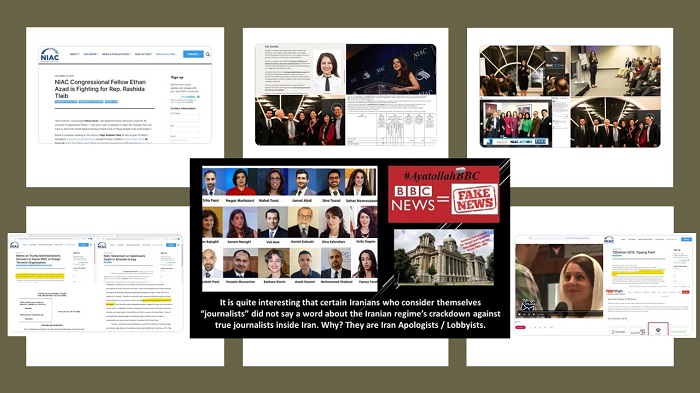

A high-ranking member of the National Iranian American Council (NIAC) began a six-year term on Stanford University’s Board of Trustees on October 1, according to an announcement posted on the university’s website this summer. The appointment of Lily Sarafan provides a group that is known for lobbying for the Iranian regime an opportunity to extend its influence in this prestigious university.
Who is Lily Sarafan?
Lily Sarafan is the CEO of the San-Francisco-based company Home Care Assistants (HCA) and an active member of the NIAC, a group that advocates for the Iranian regime and its interests. Ms. Sarafan has held a number of roles within the NIAC, including donor, fundraiser, and speaker. She frequently joins the group when they lobby Congressmen and women for the regime.
🚨ALERT🚨@Stanford's new board includes @lilysarafan, an ex-board chair of @NIACouncil (Iran's US-based lobby)
Panels at its Iranian Studies Program routinely feature NIAC affiliates who promote the regime’s agenda
My new piece on Iran's influence ops: https://t.co/0KxKVKjfOB pic.twitter.com/cTX58FeIhT
— M. Hanif Jazayeri (@HanifJazayeri) October 6, 2020
Some of her most notable work for the NIAC includes:
- Sarafan was listed as Chair of the NIAC’s Board of Directors in their 2015 filings;
- She helped organize and attended a TEDx in Iran that was co-sponsored by the Iranian regime’s Vice-President for Science and Technology;
- A December 2019 report on the NIAC’s website stated that she helped fund a program to get NIAC members appointed as Congressional staffers.
Who is the NIAC?
The NIAC’s positions mirror the regime’s talking points. It lobbies for an end to the U.N. arms embargo on Iran, it condemned the U.S. designation of the Islamic Revolutionary Guards Corps (IRGC) as a Foreign Terrorist Organization (FTO), and it condemned the U.S. drone strike assassination of Quds Force Commander Qassem Soleimani.
On January 14, three U.S senators called on the U.S. Department of Justice to investigate the National Iranian American Council (NIAC), a lobby organization close to the Iranian regime and Foreign Minister, Javad Zarif.https://t.co/0z6f3Jy10r#Iran #FreeIran2020 @USAdarFarsi pic.twitter.com/G98mCuF1Jn
— MEK Iran (Mujahedin-e Khalq) (@MEK_Iran) January 18, 2020
The NIAC has been accused of spreading propaganda and lobbying on behalf of the Iranian regime. In 2012, the U.S. District Court for the District of Columbia wrote that the NIAC and its president Trita Parsi were “first and foremost an advocate for the regime.”
According to a report on @NIACouncil’s website, @lilysarafan (a new @Stanford Trustee) helped fund a program to install NIAC members as Congressional staffers. That's particularly worrying since NIAC is known as an arm of Iran's Intelligence Ministry in the US.
CC @KerriKupecDOJ pic.twitter.com/YNy8Oe7j3q
— M. Hanif Jazayeri (@HanifJazayeri) October 6, 2020
Any person or group who lobbies on behalf of a foreign government is required to disclose their identities. Failure to do so is a violation of the Foreign Agents Registration Act (FARA) and is punishable by law. The People’s Mojahedin Organization of Iran (PMOI / MEK Iran), has called attention to the NIAC’s ties to the regime many times.
U.S. Senators Mike Braun (R-Indiana), Tom Cotton (R-Arkansas), and Ted Crus (D-Texas) called for an investigation into the NIAC and NIAC Action for possible FARA violations in a January 2020 letter to Attorney General William Barr.
Stanford’s Iranian Studies Program
Ms. Sarafan’s appointment is only the most recent example of the NIAC’s attempts to influence the academic culture at Stanford. The university’s Iranian Studies program has become a hotbed of pro-regime propaganda hosted by NIAC members.
What’s more, @lilysarafan (@Stanford's newest Trustee) was in Iran in 2015 to attend a TEDx event (which she helped organize) on behalf of the regime's US-based lobby @NIACouncil. Worse still, that event was co-sponsored by Iran's Vice-Presidency for Science and Technology pic.twitter.com/D2gSRRMhm5
— M. Hanif Jazayeri (@HanifJazayeri) October 6, 2020
At least two NIAC members are major donors to Stanford’s Iranian Studies program, according to public records. This provides both influence and access into the program, as evidenced by the frequency that NIAC members are invited to participate in the program’s panels.
As the popularity of the #MEK grows more articles are published against the MEK but much of it is old news that has already been challenged. However, other sources were used to discredit the MEK in the form of 14 complete books which were published in just 12 months. #Iran pic.twitter.com/B62apEOdOa
— MEK Iran (Mujahedin-e Khalq) (@MEK_Iran) October 6, 2020
In June of this year, the Iranian Studies program hosted a webinar with former Majlis (parliament) member Faezeh Hashemi Rafsanjani that was live-streamed from Iran. It is unlikely this event could occur without approval from the regime.
The MEK has successfully managed to counter any false information about its movement and it now has support from throughout the world and many of these supporters believe that the Iranian resistance, the National Council of Resistance of Iran’s (NCRI), and (PMOI / MEK Iran), offers a viable alternative to the current regime. Many of them have contributed to several international video conferences arranged by the National Council of Resistance of Iran.
MEK Iran (follow them on Twitter and Facebook)
and People’s Mojahedin Organization of Iran – MEK IRAN – YouTube







